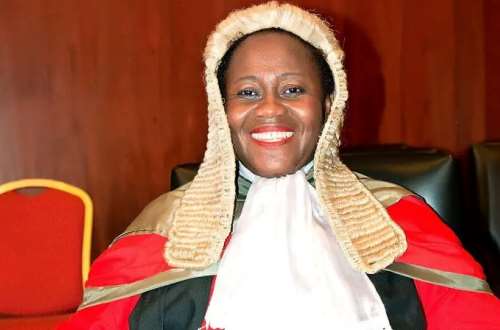Her Ladyship Justice Gertrude Araba Esaaba Sackey Torkornoo
The Chief Justice, Gertrude Torkornoo, has introduced a shift system in the courtroom system on pilot basis as the Judiciary takes steps to improve justice delivery in the country.
The move dubbed, ‘Court Shift System’ which takes effect on March 25, 2024, aims at reducing the backlog of cases in some identified courts across the country.
The shift system would begin in eight courts – three High Courts, one Circuit Court and three District Courts within the Greater Accra Region and a High Court in the Eastern Region.
It will run on two shifts with the morning shift for affected courts, running from 8:30am to 1:30pm while the afternoon session will be from 2:00pm to 6:30pm.
A circular, issued and signed by the Judicial Secretary, Justice Cyra Pamela Koranteng, said the shift system is to optimise “the use of existing court resources to reduce the volume of cases before the courts, effective March 25, 2024.”
It said the rationale for the Court Shift System stems from the fact that, findings from a physical count of dockets undertaken in all courts nationwide demonstrated that a number of identified courts have huge caseloads with some in excess of 600 pending cases.
“It is envisaged that the Court Shift System when implemented, will reduce the backlog of cases in the specified courts, improve accessibility to justice for citizens by offering flexible court hours that accommodate diverse schedules, and enhance the overall effectiveness of the judicial system,” the circular noted.
The courts selected for the pilot Court Shift System include High Court ‘1’, Adentan; High Court ‘2’, Adentan; High Court ‘1’, Amasaman and High Court, Nsawam.
The rest are Circuit Court, Weija; District Court, La; District Court, Teshie and District Courts A&B, Madina.
Justice Reforms
Stakeholders in the justice delivery system have over the years called for reforms in the system, particularly, finding ways to clear a backlog of cases in some courts due to the adversarial nature of Ghana’s justice system.
Various Chief Justices have in the past introduced different policies all aimed at accelerating justice delivery and ultimately clearing those backlogs of cases.
They have and continue to encourage lawyers and arbitrators to use Alternative Dispute Resolution in the dispensation of justice, to solve their problems rather than resorting to the usually long and costly court adjudications.
Retired Chief Justice Anin Yeboah, speaking at an induction of new lawyers in November 2022, had indicated that an effective implementation of Alternative Dispute Resolution in the courts and within the communities would generally decongest the courts of the heavy backlog of cases, which will enable judges and magistrates to hear cases expeditiously and efficiently, thus, improving confidence in the Judiciary.
The E-Justice system which introduced the use of technology has also improved justice delivery in the country, as it has introduced virtual hearings to allow lawyers and litigants join court proceedings remotely when necessary.
Divide
There is, however, a divide between lawyers about the prospect of running a shift system, given it extends the hours they have to spend in court.
Some believe it will speed up the process and get cases that have been in court for years dealt with, thereby bringing a conclusion to them.
Others think it will add additional pressure on lawyers as they would have to make extra preparations and provisions to be in court up to 6:30pm instead of the usual 4pm or 5pm.
BY Gibril Abdul Razak


